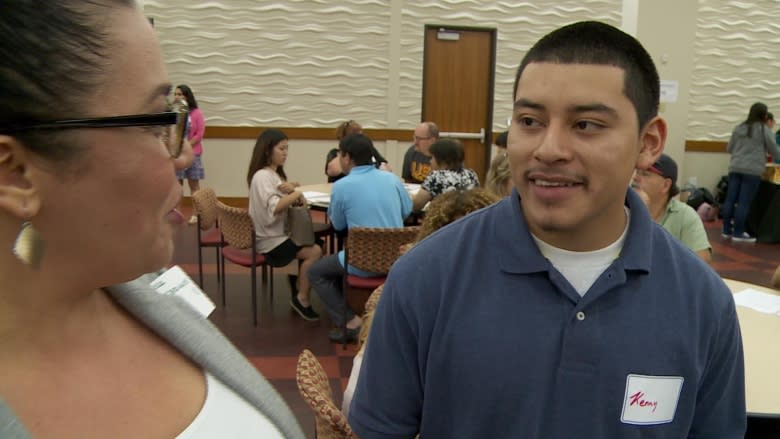University a 'big deal' for the first post-secondary student in the family
It's move-in day at the University of Southern California, and it looks like the whole Los Angeles campus is on wheels.
More than 3,000 students are lugging suitcases, unloading laptops and unpacking clothes — or, in many cases, getting their moms and dads to do it for them.
For most parents, it's a bittersweet reminder of their awkward first day at university. But Dominique Codjia's parents have something in common with their 18-year-old daughter: this is the first time they've seen the inside of a dorm room other than in movies.
"Ever since she was born it's something we talked about, going to college," says Dominique's mom Jamie. She never went to university, and neither did dad Henri, who came to the U.S. from Benin with $5 in his pocket.
"She's going further than I have been in my life," he says with a broad smile.
Dominique, a philosophy student, is among the 20 per cent of American students who will be the first in their family to attend university.
On the ride from their Wisconsin home to USC, the Codjias talked about the depressing statistics: overall, 59 per cent of American university students graduate. But for students who are first in their families to attend university, that number drops to 11 per cent.
Dealing with helicopter parents
Prof. George Sanchez of the USC American studies department says the classmates of these first-generation students have to deal with helicopter parents who cause problems by hovering. But parents who didn't go to university often do the opposite.
"They tend to drop off their kids, then really step out of the way," Sanchez says. "And what the studies show is that that's not healthy for the student him or herself. The more the student feels like college is a completely different environment, disconnected form their family, the harder it is for them to be successful."
Having a parent who went to university helps students with everything from getting internships to learning how to handle their first C.
"If you stumble right out the gate as a freshman, have your first really tough exam, you can go to your parents," Sanchez says. "But if they didn't go to college, they won't really know what to do."
Even the little things can be a big deal, says first-generation student-in-chief Michelle Obama. She recorded a video for these students, revealing that even the basics of university life left her stumped.
"In fact, when I moved in, I realized that I hadn't even packed the right size sheets for my bed. Mine were way too short. So that first night, I slept with my legs sticking out past the end of the sheets, rubbing up against one of those old plastic mattresses. And I ended up sleeping that way for my entire freshman year," Obama says.
Preparing for 'the unknown'
Helping these students is vital, Sanchez says, because the percentage of them in the U.S. is growing. He leads a strategy seminar for them and their parents, and his advice doesn't come only from a textbook. His parents never went to high school, much less university.
"As immigrants with a sixth-grade education, they did their best to prepare me for the unknown," Sanchez says. "On the way to the airport they took me to the local priest and had them bless me on my journey."
He tells parents the best way to prepare their children for their own journey is simple: stay in touch and stay involved. You don't need to know chemistry or physics to help your kids.
"All studies in education show that, particularly for students who are the first in their family to go to college, continued connection and communication with their parents is vital for their success in college," Sanchez says.
It's an inspiring story for Kenny Barrera, 18, and his family, who immigrated from Guatemala. Almost half of the first-in-their-family students are Latinos, many of whom also have to deal with a language barrier and a poor background.
"It's actually the first time I'm away from home," Barrera says with a shy smile. He is studying mechanical engineering.
"I don't think there's words to explain that feeling. It's something new, especially in our family, like a feeling that none of us have experienced so far. I think it's special because there's a change in the dynamics of our family. I'm trying to do more to have a better future for our family and hopefully for generations after this."
Back at Dominique Codjia's room, she says goodbye to her parents and hops up on her bed to meet her new dorm-mates.
"Maybe they don't really get how big of a deal it is, but for me it's a really big deal," she says. "And I think the pressure to do well is a lot bigger just because you don't really have anything to fall back on."
In high school, she thought university meant freedom. But like Barrera, seeing what this means for her family's future, she says it's a different kind of freedom than she ever imagined.




